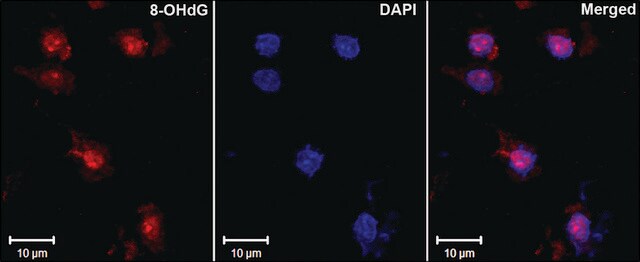おすすめの製品
由来生物
rabbit
品質水準
抗体製品の状態
affinity isolated antibody
抗体製品タイプ
primary antibodies
クローン
polyclonal
精製方法
affinity chromatography
化学種の反応性
human
テクニック
western blot: suitable
NCBIアクセッション番号
UniProtアクセッション番号
輸送温度
wet ice
ターゲットの翻訳後修飾
unmodified
遺伝子情報
human ... OGG1(4968)
詳細
The protein named N-glycosylase/DNA lyase or alternatively, 8-oxoguanine (8-OxoG) DNA glycosylase or AP lyase, and encoded by the gene named OGG1/MMH/MUTM/OGH1, is a DNA repair enzyme that incises DNA at 8-oxoG residues and excises 7,8-dihydro-8-oxoguanine and 2,6-diamino-4-hydroy-5-N-methylformamidopyrimidine (FAPY) from damaged DNA. OGG1 also has beta-lyase activity that nicks DNA 3′ to the lesion. OGG1 is localized to the nucleus and nucleoplasm; in UVA-irradiated cells it can be found in the nuclear speckles. There is also an isoform found in the mitochondrion. Interestingly, OGG1 appears to be play a critical role in repairing mtDNA damage; mtDNA damage is linked to mitochondrial dysfunction, increased oxidative stress, and insulin resistance in muscle cells, and studies using OGG1 knockouts or over expressing OGG1 demonstrate that OGG1 is important for proper mtDNA damage repair and that disruption of OGG1 can lead to increased mtROS (reactive oxygen species) production and subsequent regulation of downstream events leading to insulin resistance in skeletal muscle. OGG1, or rather defects in OGG1 function, are also associated with a number of carcinomas, particularly Renal Cell Carcinomas of various cell types.
免疫原
Recombinant protein corresponding to human OGG1.
アプリケーション
Research Category
エピジェネティクス及び核内機能分子
エピジェネティクス及び核内機能分子
Research Sub Category
核受容体
核受容体
This Anti-OGG1 Antibody is validated for use in Western Blotting for the detection of OGG1.
Western Blotting Analysis: A representative lot detected recombinant protein OGG1 (Bjoras, M., et al. (1997). EMBO. 16(20):6314–6322).
Western Blotting Analysis: A representative lot detected OGG1 in Melphalan-resistant cells (Sousa, M., et al. (2013). PLOS One. 8(2):e55493).
Western Blotting Analysis: A representative lot detected OGG1 in Melphalan-resistant cells (Sousa, M., et al. (2013). PLOS One. 8(2):e55493).
品質
Evaluated by Western Blotting in recombinant protein OGG1.
Western Blotting Analysis: A 1:1,000 dilution of this antibody detected recombinant protein OGG1 in 1 µg of cell lysate.
Western Blotting Analysis: A 1:1,000 dilution of this antibody detected recombinant protein OGG1 in 1 µg of cell lysate.
ターゲットの説明
~38 kDa observed
物理的形状
Affinity purified
Purified rabbit polyclonal in buffer containing PBS with 0.05% sodium azide.
保管および安定性
Stable for 1 year at 2-8°C from date of receipt.
その他情報
Concentration: Please refer to lot specific datasheet.
免責事項
Unless otherwise stated in our catalog or other company documentation accompanying the product(s), our products are intended for research use only and are not to be used for any other purpose, which includes but is not limited to, unauthorized commercial uses, in vitro diagnostic uses, ex vivo or in vivo therapeutic uses or any type of consumption or application to humans or animals.
適切な製品が見つかりませんか。
製品選択ツール.をお試しください
保管分類コード
10 - Combustible liquids
WGK
WGK 2
引火点(°F)
Not applicable
引火点(℃)
Not applicable
適用法令
試験研究用途を考慮した関連法令を主に挙げております。化学物質以外については、一部の情報のみ提供しています。 製品を安全かつ合法的に使用することは、使用者の義務です。最新情報により修正される場合があります。WEBの反映には時間を要することがあるため、適宜SDSをご参照ください。
Jan Code
ABE1372:
試験成績書(COA)
製品のロット番号・バッチ番号を入力して、試験成績書(COA) を検索できます。ロット番号・バッチ番号は、製品ラベルに「Lot」または「Batch」に続いて記載されています。
M Bjorâs et al.
The EMBO journal, 16(20), 6314-6322 (1997-10-08)
The guanine modification 7,8-dihydro-8-oxoguanine (8-oxoG) is a potent premutagenic lesion formed spontaneously at high frequencies in the genomes of aerobic organisms. We have characterized a human DNA repair glycosylase for 8-oxoG removal, hOGH1 (human yeast OGG1 homologue), by molecular cloning
Mirta M L Sousa et al.
PloS one, 8(2), e55493-e55493 (2013-02-14)
Alterations in checkpoint and DNA repair pathways may provide adaptive mechanisms contributing to acquired drug resistance. Here, we investigated the levels of proteins mediating DNA damage signaling and -repair in RPMI8226 multiple myeloma cells and its Melphalan-resistant derivative 8226-LR5. We
ライフサイエンス、有機合成、材料科学、クロマトグラフィー、分析など、あらゆる分野の研究に経験のあるメンバーがおります。.
製品に関するお問い合わせはこちら(テクニカルサービス)